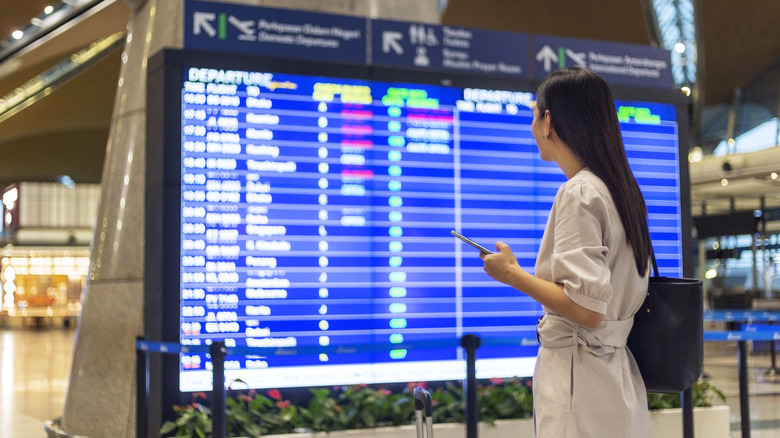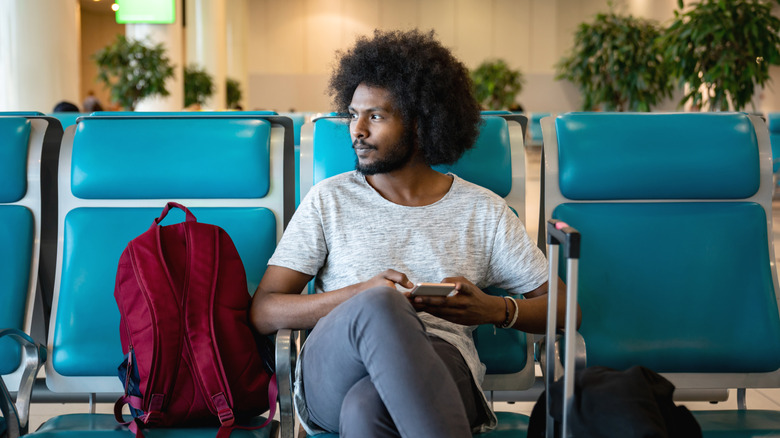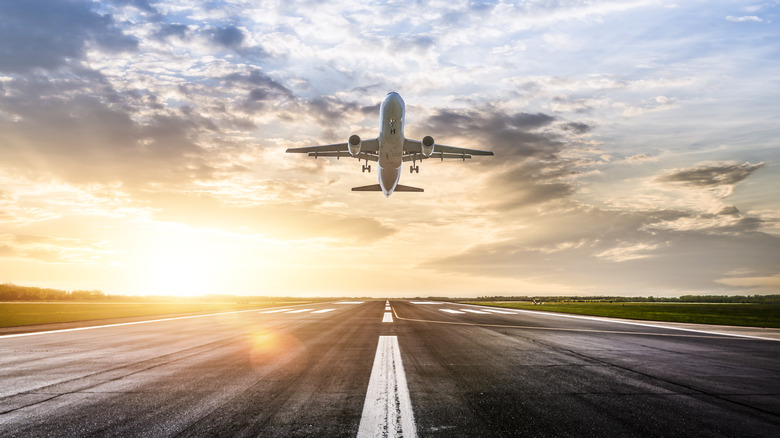Lower Your Chances Of Annoying Delays By Avoiding Flights At This Time Of Day
Most of us have heard it's best to arrive at the airport two or three hours before a flight. This window offers enough time for checking in, passing through security, and finding the boarding gate. However, it's not uncommon to rush to the airport early, only to wait around for a delayed flight. In fact, a January 2024 report by the U.S. Department of Transportation indicated that nearly 14% of flights departing from American airports were delayed by at least 15 minutes.
While weather, aircraft maintenance, and a host of other issues could cause a flight to run behind schedule, dealing with delays isn't all up to chance. According to insiders, the time you choose to fly could impact whether you leave when expected. The experts at Going.com revealed that the afternoon is a common time to experience flight delays. "Afternoon flights almost always use a plane that has to fly in from elsewhere, and if that flight gets disrupted, well, then your flight is at risk," a Going.com spokesperson told The U.S. Sun.
Storms are also known to strike more often in the afternoon than at other times of the day due to a rise in air temperature and humidity. To avoid waiting hours for bad weather to pass, consider booking your flight for an earlier time.
Delays are also common in the evening
Considering flight delays tend to increase by the afternoon, it's no surprise that evening flights would be impacted, too. The Department of Transportation report looked at the 30 largest U.S. airports and found that delays are most likely in the evening. The worst flight time to book, according to the data, is between 8 p.m. and 8:59 p.m., when only 79% of flights leave within 15 minutes of their scheduled departure time.
A separate study by The Points Guy (via Forbes) found a similar pattern in arrival times. The data, pulled from 2018, showed that 27% of flights set to land between 8 p.m. and 10:59 p.m. were at least 15 minutes late — more than any other period throughout the day.
However, it's important to note that late-night flights are less likely to run late. The Department of Transportation report shows that journeys beginning between 11 p.m. and 11:59 p.m. were found to leave on schedule nearly 89% of the time. Consider that one reason to book the red eye on your next trip.
Morning is the best time to fly
Bad news, night owls: It really pays off to be an early bird as a traveler. Those who fly in the morning are the least likely to run into annoying delays. The Department of Transportation found that 93.5% of flights from the 30 largest U.S. airports departing between 6 a.m. and 6:59 a.m. took off on time, with the rate steadily dropping with each hour. By noon, only 86.5% of flights departed around their scheduled time.
There are several reasons why morning flights tend to be more punctual. As the expert from Going.com told The U.S. Sun, planes scheduled to fly in the morning have been sitting at the airport overnight and are ready to go once it's time to board. As the day goes on and flight delays cause a cascading effect, there's also more risk of staff shortages. This is due to regulations that limit how many hours pilots and flight attendants can work. If, for instance, a morning flight ran into trouble and ate up more hours than crew members were scheduled to work, they may have to skip their next scheduled flight to avoid working too many hours. At that point, you may be forced to wait at your gate until the airline finds a replacement.


